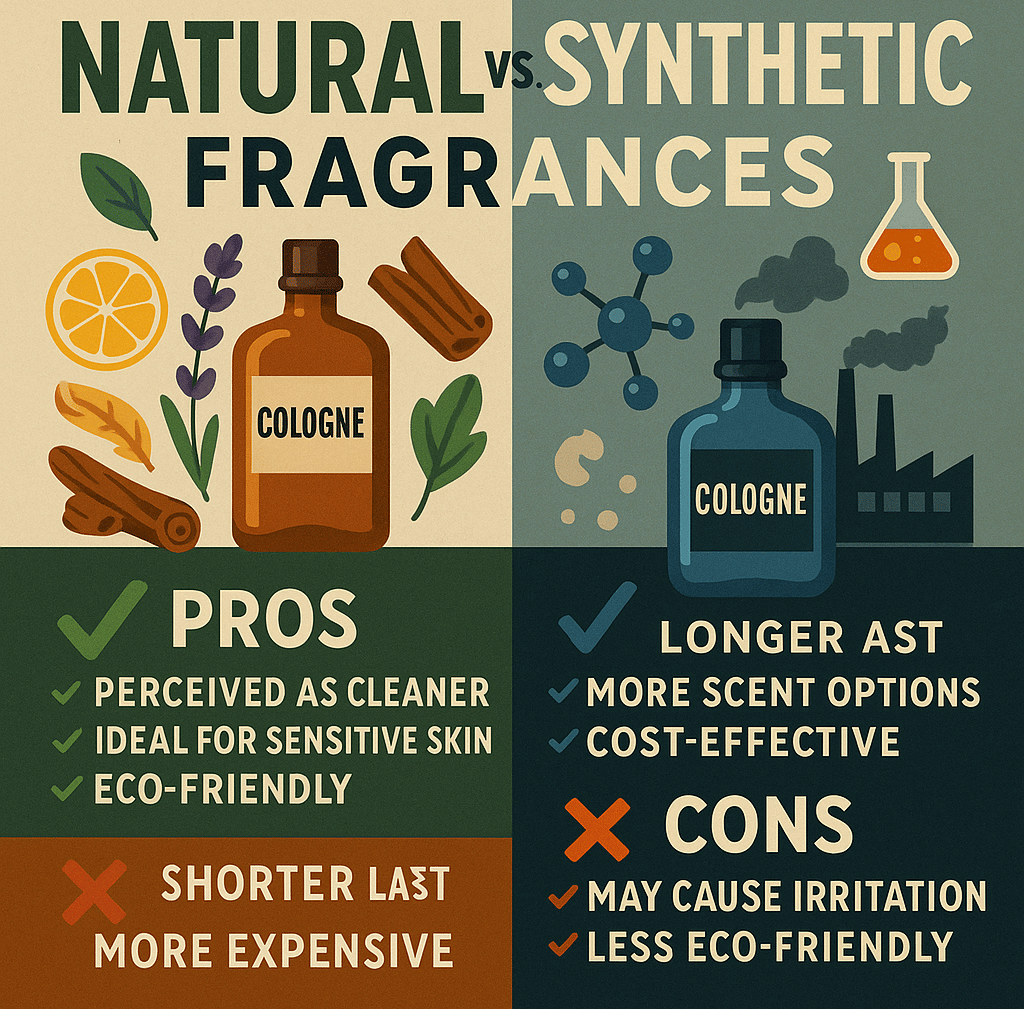Natural vs. Synthetic Fragrances: What Men Should Know
Confused about natural vs. synthetic fragrances? Discover what men should know about scent ingredients, safety, performance, and choosing the right cologne.
7/19/2025


Natural vs. Synthetic Fragrances: What Men Should Know
When it comes to cologne, most guys are focused on one thing—how good it smells. But there’s more under the surface than scent alone. One of the most overlooked choices in men’s fragrance is deciding between natural and synthetic ingredients.
Both have their pros and cons. And if you care about skin sensitivity, longevity, or even the planet, knowing the difference matters.
Here’s what every man should know about natural vs. synthetic fragrances—and how to choose the one that suits your style and values best.
What Are Natural Fragrances?
Natural fragrances are made using essential oils, plant extracts, and animal-derived ingredients (though the latter are rare today and often replaced with ethical alternatives).
Common Ingredients Found in Natural Scents
Citrus oils (like bergamot, lemon, grapefruit)
Herbs (lavender, rosemary, sage)
Wood resins (cedarwood, sandalwood)
Spices (clove, cinnamon, cardamom)
These ingredients are typically distilled, pressed, or extracted from natural sources.
Pros and Cons of Natural Fragrances
✅ Pros:
Perceived as healthier and cleaner
Fewer synthetic chemicals
Eco-friendly sourcing (in some cases)
Ideal for sensitive skin types
❌ Cons:
Shorter longevity
Less projection (sillage)
Higher price point
Limited availability of certain notes
What Are Synthetic Fragrances?
Synthetic fragrances are created in labs using man-made aroma compounds, either by replicating natural ingredients or creating entirely new scent molecules.
How Synthetic Fragrances Are Made
Chemists use a mix of aroma chemicals and fixatives to mimic or enhance natural smells. Many popular designer colognes today—like Dior Sauvage and Bleu de Chanel—are mostly synthetic.
Pros and Cons of Synthetic Fragrances
✅ Pros:
Longer-lasting on skin
Greater projection and complexity
Cost-effective to produce
More diverse scent options (e.g., metallic, aquatic, gourmand)
❌ Cons:
May cause irritation on sensitive skin
Can include allergens or phthalates
Often less eco-friendly in production
Key Differences: Natural vs. Synthetic Fragrances
Let’s break down the four main differences you should know when buying cologne.
1. Performance and Longevity
Natural scents: Tend to fade within 2–4 hours
Synthetic scents: Often last 6–12 hours or more
If you need an all-day cologne, synthetics typically outperform.
2. Price and Availability
Natural colognes: Higher cost due to sourcing and extraction
Synthetic colognes: More affordable and widely available
Designer brands often blend both to balance price and quality.
3. Skin Sensitivity and Reactions
Natural scents: Gentler for people with allergies
Synthetic scents: May contain potential irritants or allergens
If you have skin sensitivities, patch test any new fragrance first.
4. Environmental Impact
Natural scents: Eco-friendly when sustainably sourced—but overharvesting can be an issue
Synthetic scents: Often less sustainable but require less raw material from nature
Ethical sourcing and green chemistry matter here.
How to Choose Between Natural and Synthetic Scents
Choosing the right fragrance type comes down to lifestyle, preferences, and skin compatibility.
Matching Fragrance Types to Your Lifestyle
For the health-conscious: Try all-natural colognes with essential oils
For long-lasting wear: Go synthetic or a blend
For a unique scent profile: Consider niche synthetic fragrances
Understanding Labels and Ingredient Lists
Look for these keywords:
“100% natural” or “essential oil-based” for natural fragrances
“Fragrance” or “parfum” on a label usually indicates synthetic components
Watch for common irritants: alcohol, parabens, phthalates
Trusted Brands Offering Each Type
Natural fragrance brands:
Herban Cowboy
Lurk
Abbott NYC
Synthetic or blended designer brands:
Dior
Tom Ford
Yves Saint Laurent
Each has its own style and scent philosophy—explore both!
FAQs About Natural and Synthetic Fragrances
Q1: Are natural fragrances safer than synthetic ones?
Not always. Natural doesn’t mean hypoallergenic. Patch test to be safe.
Q2: Why are natural colognes more expensive?
Because natural ingredients are harder to extract and cost more to produce.
Q3: Do synthetic fragrances smell fake?
Not necessarily. Many high-end colognes use synthetics masterfully.
Q4: Can I mix natural and synthetic fragrances?
Yes! Some of the best blends use both for balance and performance.
Q5: Are natural colognes better for the environment?
They can be—if sourced ethically. But overharvesting natural oils can also harm ecosystems.
Q6: What’s the best way to store cologne?
Keep it cool, dry, and out of sunlight to extend shelf life.
Conclusion
There’s no right or wrong choice between natural vs. synthetic fragrances—only what fits you best. Natural scents offer purity and simplicity, while synthetics bring power and variety. Explore both worlds and let your nose—and your lifestyle—lead the way.

